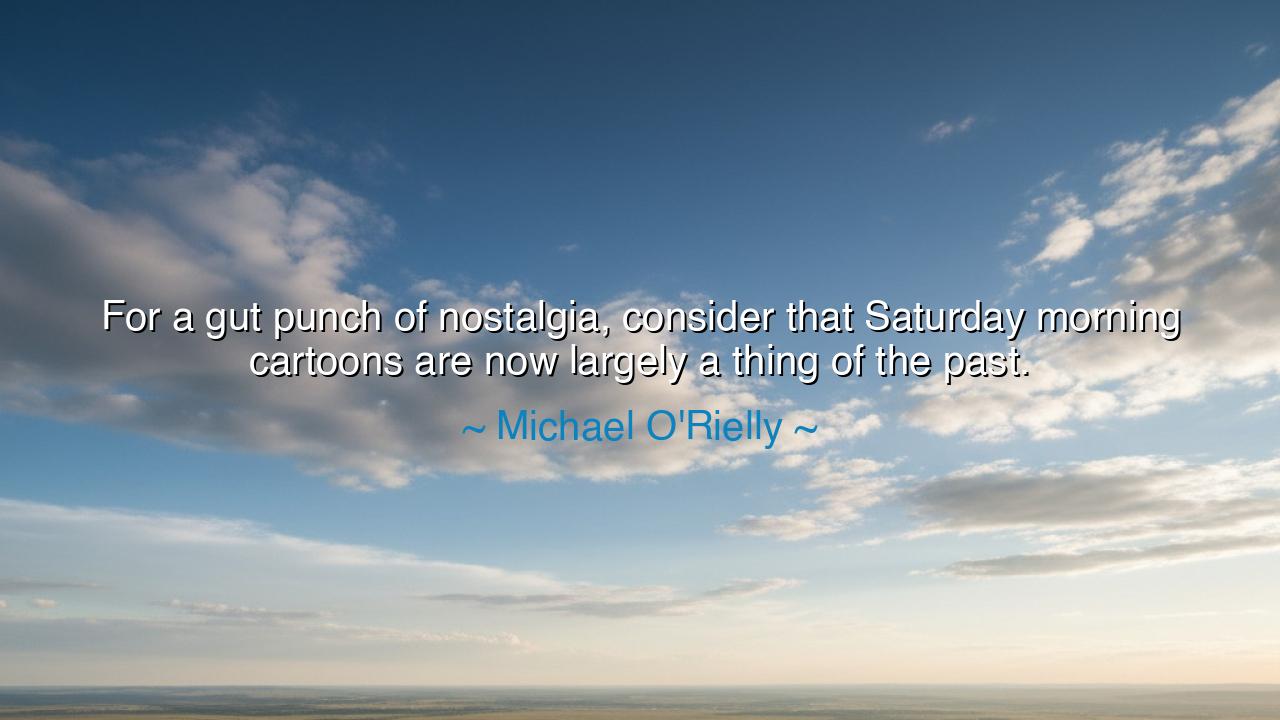
For a gut punch of nostalgia, consider that Saturday morning
For a gut punch of nostalgia, consider that Saturday morning cartoons are now largely a thing of the past.






"For a gut punch of nostalgia, consider that Saturday morning cartoons are now largely a thing of the past." In these words, Michael O'Rielly evokes a profound sense of loss and change, reminding us that what once shaped our childhood experiences and defined a simpler era is now slipping away into the shadows of history. The mention of Saturday morning cartoons, once a cherished ritual for millions, reflects how the passing of time reshapes our lives and memories, and how the things we hold dear can so easily fade into oblivion. O'Rielly's words, imbued with a sense of nostalgia, touch upon a universal truth: change is inevitable, and with it, we often lose the familiar comforts that once brought joy and meaning to our daily lives.
In the ancient world, nostalgia was a complex emotion, not only tied to personal memories but also to the passage of time and the loss of past glories. The Romans, for instance, often reflected on the decline of their empire, mourning the days when their cities stood at the peak of power and prosperity. In his Meditations, Marcus Aurelius writes of the fleeting nature of all things, acknowledging that even the grandest of achievements will eventually fade. This recognition of impermanence echoes in O'Rielly's lament about the passing of Saturday morning cartoons—a cultural milestone for many—revealing the universal human experience of reminiscing about the past and the profound sense of loss that often accompanies it.
Consider the ancient Greeks, who, in their reflection on the transitory nature of life, turned to the concept of memento mori—the reminder of mortality. While not explicitly nostalgic, this concept teaches that all things, whether joyous or painful, are subject to change and decay. Heraclitus, the great philosopher, famously stated that “everything flows,” a reminder that nothing remains stagnant. In much the same way, Saturday morning cartoons, once a fixture of childhood, have flowed into the past, replaced by new forms of entertainment, but leaving behind a bittersweet void that many feel. This passage of cultural icons reflects the broader rhythms of life, where the moments we cherish today will one day be mere memories.
In more recent history, we can see this theme of change and nostalgia reflected in the lives of musicians like The Beatles. As the band transitioned from their early pop songs to more complex and reflective works, they often expressed a longing for the innocence of their earlier years. John Lennon himself remarked on how the world seemed to change so rapidly, and how even something as transient as a song could evoke deep feelings of longing for a simpler time. O'Rielly's reflection on cartoons echoes this same sentiment: the things that define our childhoods—be they music, cartoons, or cultural practices—are fleeting. The momentary joy they bring is soon replaced by the inevitable progression of life, leaving us to reflect on what is lost.
The lesson in O'Rielly’s words is that the nostalgia we feel for the past is a natural and powerful emotion that reminds us of our deep connection to the moments that shape us. But more than that, it is a reminder of the impermanence of life, of how everything we experience, even our fondest memories, will one day fade. The Saturday morning cartoons, once a symbol of childhood joy, are now part of history, just as the cultures and traditions of ancient civilizations are now memories, preserved only in texts, stories, and relics. This truth can evoke sadness, but it can also inspire us to cherish the present, to hold dear the moments we have now, knowing that they too will one day become the nostalgic memories of tomorrow.
In our own lives, we must recognize that nostalgia, though a beautiful emotion, can also serve as a reminder to live fully in the present. Just as Heraclitus teaches us to embrace the flow of life and its inevitable changes, we too must learn to appreciate the fleeting moments we experience. Whether it is a quiet morning ritual, a conversation with a loved one, or an event we enjoy today, these moments are the foundations of the memories we will cherish in the future. Let us take the lesson of nostalgia and change to heart, and, rather than lamenting what is lost, choose to celebrate what we have now, knowing that time is ever-moving, but the present is ours to embrace.
So let us be reminded by O'Rielly’s words and the ancient wisdom that impermanence is not something to fear, but to honor. Let the passing of the cartoons and cultural moments we hold dear motivate us to create new memories, to seize the present, and to live with gratitude for the fleeting moments that make life rich and meaningful. The Saturday morning cartoons may be gone, but the lessons they impart—of joy, simplicity, and shared experiences—are still with us, carried forward in our own stories and in the new traditions we create for generations to come.






AAdministratorAdministrator
Welcome, honored guests. Please leave a comment, we will respond soon